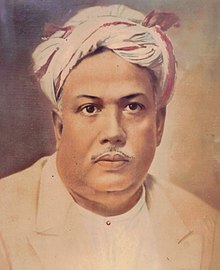M. K. Mackar Pillay
Manadath Kunju Mackar Pillay (1880 – 1966) was an Indian industrialist, banker, philanthropist, and politician who served in the Sree Moolam Popular Assembly.[1] He was a leading cashew and lemongrass exporter, and founder of the eponymous Mackar Pillay and Sons Limited.
M. K. Mackar Pillay | |
|---|---|
 | |
| Member of the Sree Moolam Popular Assembly | |
| In office 1936–1947 | |
| Nominated by | C. P. Ramaswami Iyer |
| Constituency | Alwaye Perumbavoor |
| Personal details | |
| Born | 1880 Alwaye, Madras Presidency, British India |
| Died | 19 May 1966 (aged 85–86) Alwaye, Kerala, India |
| Nationality | |
| Spouse(s) | Ishumma Tharackandathil Amina Tharackandathil |
| Children | 17 |
| Relatives |
|
| Occupation | Agriculturalist Exporter Politician |
Pillay was the promoter of the Bank of Alwaye, Alwaye Municipality's primary financial institution, before it was merged into the State Bank of Travancore in 1965.
Biography
Mackar Pillay was born to Manadath Kunju, an Aluva agriculturalist and trader, as the second of three sons.
In 1941, Pillay founded Mackar Pillay & Sons, one of the largest trading firms in the Kingdom of Travancore. The company was the first to challenge the monopoly of British trading firms in the Malabar coast by directly exporting essential oils.[2]
Pillay's older brother, M. K. Khader Pillay was the first President of the Alwaye Municipality, which was chartered in 1921. Khader Pillay was also bestowed the Khan Sahib title by the British Raj for his service during the Great Flood of 99.[3]
Philanthropy
Mackar Pillay was instrumental in the establishment of co-operatives that strengthened Aluva's local economy, including the Keezhmad Khadi and Village Industries Co-operative Society[4], and the Keezhmad Co-operative Bank.
Pillay was also a proponent of the education of Muslim women. He presented a considerable scholarship endowment to the Aligarh Muslim University for funding the education of the institution's female students.[2]
Namesakes
- MES M. K. Mackar Pillay College of Advanced Studies, Edathala[5]
- M. K. Mackar Pillay Pay-ward at the Aluva Government Hospital
Descendants
- Javad Hassan - former IBM and AMP Inc. executive, founder and chairman of the NeST Group
References
- "History of legislative bodies in Kerala-- Sri Moolam Praja Sabha". www.keralaassembly.org. Retrieved 19 June 2020.
- "റയോൺസിൻ്റെ സൈറൺ മുഴങ്ങുന്നു, "പ്രത്യാശയിലേക്ക് "". NewsWaves. 10 June 2020. Retrieved 19 June 2020.
- "خان صاحب", آزاد دائرۃ المعارف، ویکیپیڈیا (in Urdu), 7 June 2020, retrieved 19 June 2020
- "Khadi & Village Industries Co-operative Society". kkvics.com. Retrieved 19 June 2020.
- "Renaming Order for the MES College for Advanced Studies, Edathala" (PDF). Mahatma Gandhi University Register. 3 December 2019.